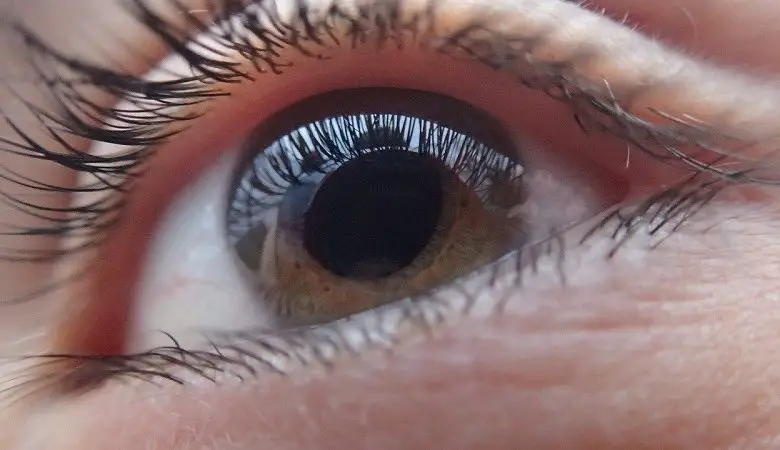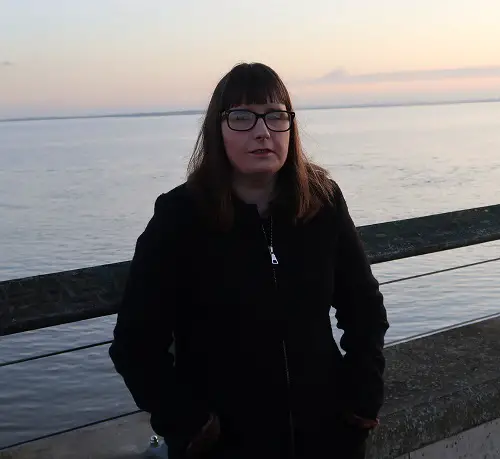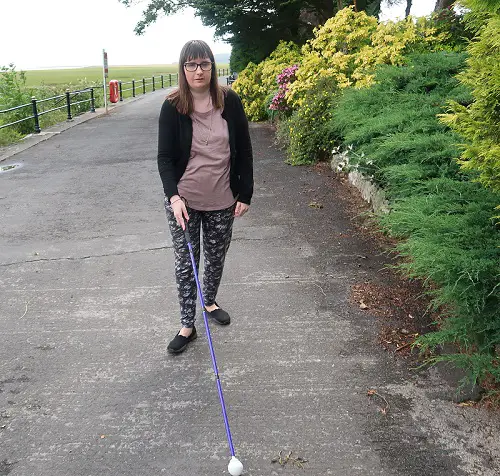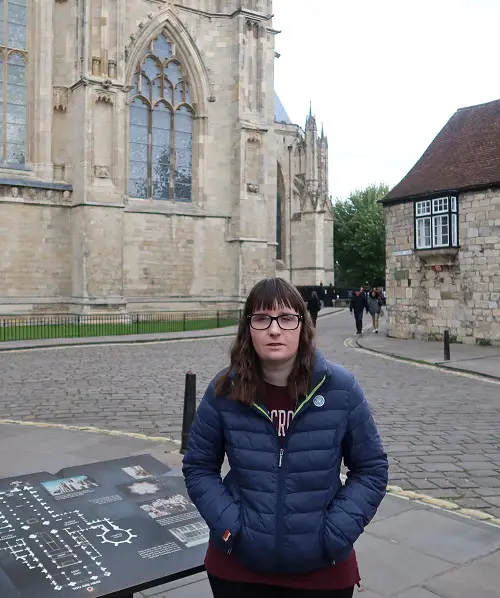
8 misconceptions about visual impairment and blindness busted
This is an updated post from our archives exploring common misunderstandings about visual impairment and blindness, aiming to challenge stereotypes and promote better understanding of the experiences of disabled people:
I’m Holly, a disability blogger who is also registered blind. I’ve come across many misconceptions surrounding visual impairment and disability over the years, and I always try to educate people when I can.
1. All blind people see total darkness
The Royal National Institute of Blind People (RNIB) found that 93% of blind and visually impaired people have some useful vision.
For instance, I have a condition called retinopathy of prematurity as I was born at 24 weeks. There are five stages of this condition, so vision can vary for everyone that has it.
I have a detached retina in my left eye, so have no useful vision in it. But I have light perception in my right eye, meaning that I can see light and dark. I definitely use my light perception more than I realise!

2. Blind and visually impaired people have amazing hearing
We learn to use our other senses effectively, but they aren’t heightened because of our visual impairment.
People often say to me: “You have amazing hearing,” but I honestly don’t think I do. I just rely on it more than sighted people.
3. Blind and visually impaired people can’t use technology
Assistive technology, such as screen readers, magnification software/magnifiers and braille displays, are all incredibly useful for people who are blind or visually impaired. So not only can we use assistive tech, we often use it every single day.
Mainstream technology also has built-in accessibility features, so it is inclusive and accessible whether or not you have a visual impairment.
We can browse websites, purchase things online, keep in touch with friends and family, use social media, read, listen to music and do work-related tasks, to name just a few, all thanks to the power of assistive tech and accessibility features.
Technology plays a huge part in my life – it enables me to do so many things. If it wasn’t for technology, then I’d be unable to do my job and live my life like everyone else.
Check out our article on the top assistive tech for blind and visually impaired people.
4. Blind and visually impaired people can’t be independent
Independence seems such a simple thing, doesn’t it? Yet when I tell people that I travel independently, hold down a job and live a fulfilling, busy and active life, they are amazed, even surprised.
I may not be able to see, but that doesn’t mean I can’t be independent. My long cane and the help of technology enable me to live my life and be independent, with just a few adaptions.

5. We can’t hold down a job
With the right adjustments and support, people with sight-loss can work just as well as sighted people. I am the only blind person in my workplace, but this doesn’t stop me from holding down my job.
Access to Work provides ‘reasonable adjustments’ to help me in the workplace, such as assistive technology and equipment, a support worker or help with travel costs.
Some sighted people also think that blind and visually impaired people don’t want to work. Actually, we do.
Take a look at Holly’s previous article for Disability Horizons with top tips to help you find for a job if you have a disability.
6. You have to change your vocabulary when talking to us
As a blind person, I say things that reference vision, such as, “I’m watching the TV” or “Have you seen that?”
You aren’t going to offend us if you use that kind of language. In fact, we’re more likely to notice if you try to change the wording of something when talking to us.
Someone once said to me that they didn’t want to say: “See you later” as I couldn’t see them. So I had to explain that it was okay for them to do so and it just felt really awkward.
7. Our visual impairment stops us from having a sense of style
We may not be able to see a nice outfit or a good make-up look, but that doesn’t mean we can’t appreciate it in other ways, such as the way it makes us feel.
The visual aspects of beauty and fashion are an important factor for some people, but it doesn’t have to be like that for everyone.
Beauty and fashion can be accessible; it just requires a few tweaks and adaptions, such as learning to apply makeup by touch or organising clothes in a way that works for you.
I’ve learned to apply my makeup by counting and the sense of touch. It took a while, but I got there.
I also have my own ways of identifying my clothes and beauty products; for me, organisation is key.
Read our article on how fashion and beauty brands can be more accessible to visually impaired people.
8. We want a cure

People assume that I must wake up every single day waiting and hoping for a cure for my visual impairment. This couldn’t be further from the truth.
Some blind and visually impaired people may hope that there is a cure for their sight-loss one day. It might also be something they think about regularly, and that’s OK.
Personally, I don’t want to spend my life waiting for a cure when it might not happen. I want to see my vision impairment as an ability and see it in a positive way.
By Holly
You can find out more about Holly by reading her blog, Life of a Blind Girl, and following her on Facebook, Twitter, Instagram and YouTube.
Understanding Visual Impairment: Beyond the Stereotypes
Visual impairment is a complex and diverse experience that goes far beyond common misconceptions. Here are some key insights:
- Diversity of Visual Experiences: Not all visually impaired people experience complete darkness. Many have some level of visual perception or partial sight.
- Independence and Capability: Blind and visually impaired people lead full, independent lives using adaptive technologies and strategies.
- Communication and Technology: Modern assistive technologies like screen readers, braille displays, and voice-activated devices have dramatically improved accessibility.
It’s crucial to recognize that visual impairment does not define a person’s potential or capabilities. Each individual has unique strengths, talents, and ways of navigating the world.
A Sighted Person’s Guide to Being an Ally to Visually Impaired Individuals
Communication Fundamentals
When interacting with visually impaired people, remember these key principles:
- Speak Directly: Always talk directly to the person, not through a companion or guide
- Use Natural Language: Feel comfortable using vision-related words like “see” or “look”
- Be Descriptive: Provide clear, precise descriptions of surroundings and situations
- Introduce Yourself: Always state your name when entering a conversation or room
Practical Etiquette Tips
- Offering Assistance
- Always ask before helping, never assume assistance is needed
- If help is accepted, allow the person to guide how they want to be assisted
- When guiding, offer your arm just above the elbow
- Provide clear verbal directions using specific language
- Interaction Dos and Don’ts
Do:
- Speak in a natural conversational tone
- Address the person by name
- Describe visual details thoroughly
- Treat them as you would any other individual
Don’t:
- Speak loudly or slowly
- Touch without permission
- Use patronizing language
- Interrupt or speak for them
- Guide Dog Etiquette
- Never pet, feed, or distract a working guide dog
- Recognize the dog is a mobility tool, not a pet
Accessibility Awareness
- Ask about preferred communication methods
- Be patient and respectful
- Focus on the person, not their disability
Inclusive Communication Strategies
- Announce when you enter or leave a space
- Provide clear verbal cues about environment and actions
- Ask if they need specific information described
Remember, the goal is to interact naturally, respectfully, and as an equal.
Key Visual Impairment Statistics
Here are 10 compelling statistics about visual impairment in the UK:
Prevalence of Sight Loss: More than two million people are living with sight loss in the UK, with a significant impact on their daily lives.
Age Demographics:
32% of people with sight loss are aged 75-84
666,000 people are aged 85+
Gender Distribution:
61% (1,280,000) are females
- 39% (820,000) are males
Severity Breakdown:
64% have mild sight loss
22% have moderate sight loss
13% have severe sight loss
Causes of Sight Loss:
23% due to Age-related Macular Degeneration
19% due to cataracts
39% due to uncorrected refractive error
Children and Visual Impairment:
Over 26,000 visually impaired children in the UK
Around half have additional special educational needs
Employment Impact:
Only 1 in 4 registered blind and partially sighted people of working age are employed
Employment rates have not changed since 1991
Daily Onset:
250 people start losing their sight every day in the UK
Equivalent to one person every six minutes
Registration:
Around 320,000 people are registered as Sight Impaired or Severely Sight Impaired
Learning Disabilities and Visual Impairment:
An estimated 96,500 adults with learning disabilities are blind or partially sighted
Adults with learning disabilities are 10 times more likely to be blind or partially sighted than the general population
Source: Royal National Institute of Blind People (RNIB) Research
More on Disability Horizons…
- 5 things I want others to know about disability
- The art of blind photography and finding your own style
- How a visually impaired boxer with muscle weakness is knocking down barriers
- Liz Johnson on her Paralympic swimming career and being a disabled entrepreneur
Originally posted on 29/05/2020 @ 12:01 am